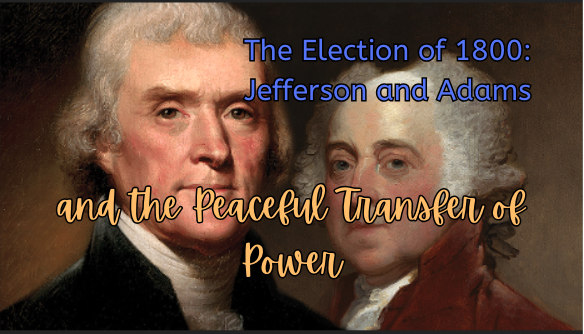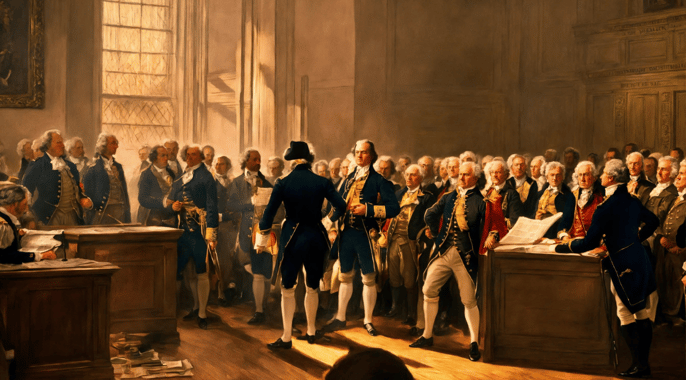"The Election of 1800: Jefferson, Adams, and the Peaceful Transfer of Power"
The election of 1800 was a pivotal moment in American history, marking not only a transition of political power but also a testament to the resilience of the young democratic republicans institutions. At its heart, this election was a contest between two Founding Fathers, Thomas Jefferson and John Adams, and it demonstrated that the United States could peacefully transfer power between rival political parties.
Casey Adams
9/23/20233 min read
The Candidates
The election of 1800 was a defining moment in American history, as it showcased the deep ideological divide between two leading figures of the time—Thomas Jefferson and John Adams.
The young nation was still shaping its political identity, and the contest would ultimately cement the foundation of America's two-party system.
Thomas Jefferson, representing the Democratic-Republican Party, was a staunch advocate for states' rights, a limited federal government, and an agrarian-based economy.
Having previously served as Vice President under Adams and as a key author of the Declaration of Independence, Jefferson's vision for the nation contrasted sharply with that of his opponent.
John Adams, the incumbent president and a Federalist, championed a strong central government, economic policies that favored industrial and commercial growth, and a robust national defense.
Adams had played a pivotal role in securing American independence, particularly in negotiating the Treaty of Paris in 1783.
However, his presidency had been marked by increasing political tensions, especially due to controversial measures like the Alien and Sedition Acts.
The Campaign
The campaign of 1800 was one of the most bitter and fiercely contested in American history.
It was characterized by intense political rivalry, personal attacks, and the growing influence of partisan newspapers.
The Federalists painted Jefferson as a dangerous radical who would lead the nation into anarchy, drawing comparisons between his political philosophy and the violent upheaval of the French Revolution.
On the other hand, Democratic-Republicans accused Adams of harboring monarchist ambitions and undermining civil liberties, particularly through the Alien and Sedition Acts, which restricted free speech and targeted Jeffersonian supporters.
Unlike modern elections with direct public engagement through debates and speeches, candidates in 1800 did not campaign personally.
Instead, their supporters waged the battle of ideas through newspaper editorials, pamphlets, and public meetings.
The press played a crucial role in swaying public opinion, and accusations, exaggerations, and outright falsehoods were common.
The Outcome
When the votes were tallied, Jefferson and Adams' starkly different visions for the future resulted in a dramatic and unprecedented electoral outcome.
Jefferson secured 73 electoral votes, while Adams finished with 65.
However, the structure of the Electoral College at the time did not differentiate between votes for president and vice president.
As a result, Jefferson's running mate, Aaron Burr, also received 73 electoral votes, leading to a tie and an electoral crisis.
With no mechanism in place to distinguish between the top two candidates, the election was thrown into the House of Representatives, where Federalists and Democratic-Republicans engaged in a tense and highly charged debate over who should rightfully assume the presidency.
After 36 rounds of voting and intense political maneuvering, Jefferson was finally declared the victor, largely due to the behind-the-scenes influence of Alexander Hamilton, who viewed Burr as untrustworthy and unfit for office.
The Twelfth Amendment and Its Impact
The chaotic nature of the 1800 election exposed a major flaw in the Electoral College system, prompting the passage of the Twelfth Amendment in 1804.
This amendment established a clear distinction between votes for president and vice president, preventing future electoral deadlocks and ensuring a more structured and transparent election process.
The amendment remains a critical component of the U.S. electoral system, shaping presidential elections to this day.
The Peaceful Transfer of Power
Despite the bitter nature of the campaign, one of the most significant outcomes of the election of 1800 was the peaceful transfer of power.
For the first time in American history, leadership transitioned from one political party to another without bloodshed or violence.
John Adams, despite his disappointment, accepted the outcome and left Washington, D.C., the night before Jefferson's inauguration on March 4, 1801.
This act of peaceful transition set a crucial precedent for democratic governance, reinforcing the principle that the will of the people should be respected regardless of political rivalry.
The Legacy
The election of 1800 fundamentally shaped the future of American elections.
It established the importance of free and fair elections, demonstrated the resilience of the nation's political institutions, and solidified the two-party system that continues to define American politics.
Moreover, it reaffirmed the commitment to a government based on constitutional principles, rather than force or coercion.
This landmark election serves as a reminder that political disagreements, no matter how intense, can be resolved through democratic means.
It underscored the adaptability of the U.S. Constitution and the necessity of periodic reform to address emerging challenges.
The peaceful transition of power remains a cornerstone of America, ensuring that leadership changes reflect the will of the people rather than the whims of those in power.
In conclusion, the election of 1800 was not just a political contest—it was a defining test of the young nation's commitment to democratic ideals.
The lessons learned from that pivotal moment continue to resonate, shaping the evolution of the American political landscape and reinforcing the enduring strength of the republic.





